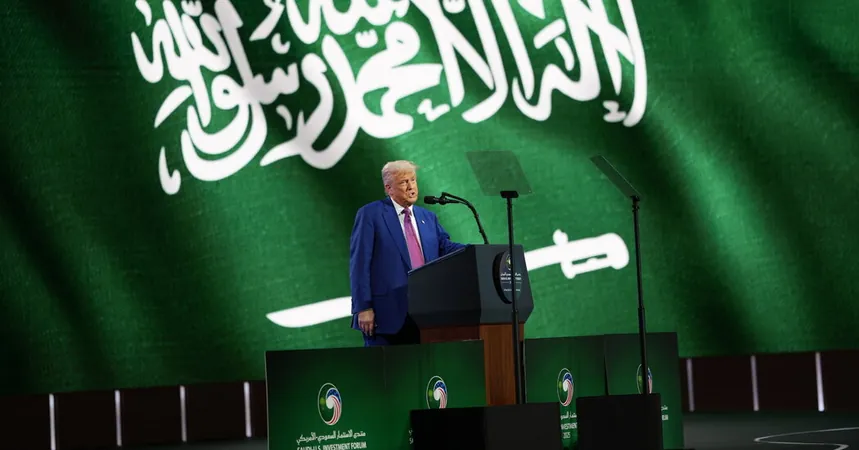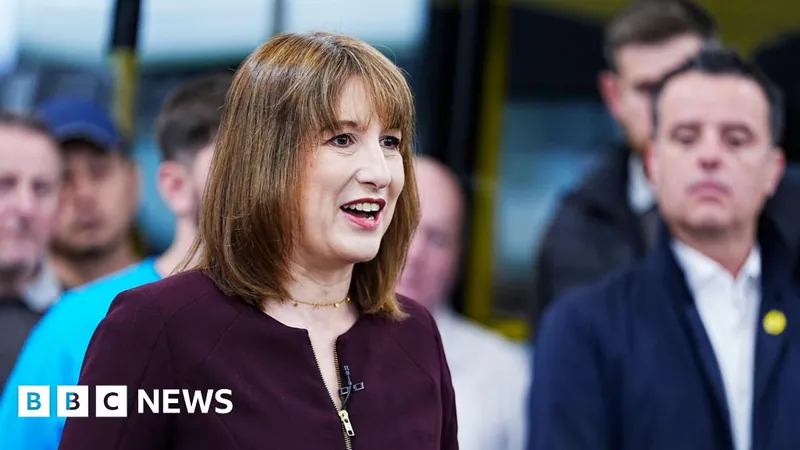
Trump's Controversial Middle East Visit: Promises Without Constraints!
2025-05-15
Author: Jessica Wong
In a striking declaration during his visit to Saudi Arabia, President Trump proclaimed a bold new era for U.S. foreign policy in the Middle East. From a lavish ballroom stage, he declared that the United States was finished with the traditional model of nation-building and would no longer impose 'lectures on how to live' on other countries.
This rhetorical shift elicited enthusiastic applause from his audience, as Trump publicly denounced years of American intervention, igniting a conversation that resonates deeply in Middle Eastern culture—from bustling cafes to living rooms punctuated by discussions about long-standing grievances.
At the investment conference in Riyadh, he unleashed a powerful critique of past U.S. actions, stating, "The so-called nation builders wrecked far more nations than they built," underscoring the complexity of the societies they sought to influence. In a move that aimed to empower regional citizens, he urged them to take charge of their own futures.
The immediacy of Trump's remarks rippled across social media platforms in a region still reeling from the consequences of American military actions in Iraq and Afghanistan, alongside growing dissatisfaction related to U.S. support for Israel amid rising humanitarian crises in Gaza.
Trump's tour of the wealthy Gulf states—Saudi Arabia, Qatar, and the UAE—was not only about business, with over $1 trillion in investment pledged to the U.S. He also hinted at inviting Saudi Arabia to follow the UAE and Bahrain in recognizing Israel, although Saudi officials insisted that such steps hinge on Palestinian statehood.
At a subsequent meeting, he found himself alongside the newly appointed leader of Syria, Ahmed al-Shara, a former rebel who played a significant role in ousting the notorious Bashar al-Assad. This unexpected alliance shocked many observers and showcased Trump's willingness to foster relationships with controversial figures.
In a region rich with Islamic heritage, Trump notably refrained from revisiting his past comments that characterized Islam negatively. Instead, he lauded Saudi Arabia, calling Crown Prince Mohammed bin Salman an 'incredible man.' This act of flattery contrasted sharply with President Biden's previous, more critical tone towards the Saudi leadership.
Critics of Trump, including Ibrahim Almadi, whose father is enduring human rights violations in Saudi Arabia, expressed disappointment that Trump did not address his father's case with Saudi officials, highlighting a stark absence of focus on human rights compared to previous administrations.
While the President's team absentmindedly ignored inquiries about human rights discussions during his visit, they celebrated his speech's warm reception. However, opposition voices within and outside Saudi Arabia labeled the address a mere public relations ploy intended to benefit the crown prince.
Despite the applause Trump received, the underlying complexities of his message—an ironic appeal for regional autonomy made in front of autocrats and foreign tycoons—did not escape scrutiny. Saudi Foreign Minister Prince Faisal bin Farhan characterized Trump's words as adopting a new mode of partnership built on mutual respect.
Experts pointed out that Trump's language echoed themes typically associated with leftist critiques of imperialism, suggesting a shift in how these narratives are received in the Middle East under rising right-wing populism.
In essence, while Trump expressed sentiments of a shift away from interventionism, analysts warn that the real priority for U.S. presidents remains furthering American interests—a perspective Trump candidly conveys, unlike his predecessors who draped their agendas in the mantle of democracy and human rights.
As the world watches, the rhetoric and reality of U.S. foreign policy in the Middle East hangs in a precarious balance, raising questions about the implications of Trump's newly touted approach.




 Brasil (PT)
Brasil (PT)
 Canada (EN)
Canada (EN)
 Chile (ES)
Chile (ES)
 Česko (CS)
Česko (CS)
 대한민국 (KO)
대한민국 (KO)
 España (ES)
España (ES)
 France (FR)
France (FR)
 Hong Kong (EN)
Hong Kong (EN)
 Italia (IT)
Italia (IT)
 日本 (JA)
日本 (JA)
 Magyarország (HU)
Magyarország (HU)
 Norge (NO)
Norge (NO)
 Polska (PL)
Polska (PL)
 Schweiz (DE)
Schweiz (DE)
 Singapore (EN)
Singapore (EN)
 Sverige (SV)
Sverige (SV)
 Suomi (FI)
Suomi (FI)
 Türkiye (TR)
Türkiye (TR)
 الإمارات العربية المتحدة (AR)
الإمارات العربية المتحدة (AR)